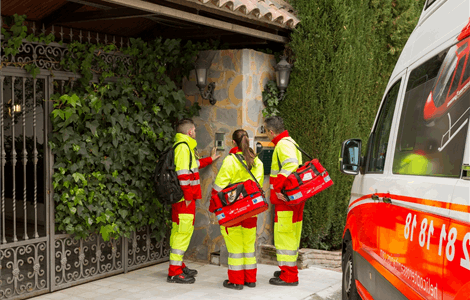
After exposure to cold, wet or windy weather, low body temperature (hypothermia) occurs. Inevitably, the body uses up its stored energy with prolonged exposure to cold air, and the body temperature starts to drop. In this article we talk about hypothermia and when to call our GP service for low temperature in Sotogrande.
What is hypothermia?
Hypothermia is a medical emergency that arises when the temperature of the body (which should be around 37C) drops below 35C. If this happens it is important that you call our GP service for low temperature in Sotogrande
When a person has dangerously low body temperature, the brain and body cannot function properly. Hypothermia that is left untreated can lead to cardiac arrest (heart stops beating) and death.
Who is at risk for developing hypothermia?
While anybody could get hypothermia, some people, conditions, and situations increase the risk of developing it. These are:
Older people. With age the ability to control body temperature decreases. Elderly people also tend to spend less energy because they are less active than younger people (which generates heat to keep the body warm).
Young children. Because children use more energy than adults, they may use their reserve when playing and not even notice that they are cold.
Babies. Infants lose body heat quicker than adults. They also don't have the energy reserve to shiver to increase body heat and can even become hypothermic when sleeping in a cold room. Signs of infant hypothermia include cold skin, bright red eyes, energy inactivity / lack and body temperature below 35C. If your child has any of these symptoms please call our GP service for low temperature in Sotogrande immediately.
Inexperienced outdoor adventure seekers such as hikers, hunters, fishers who do not have appropriate gear for cold and wet conditions.
People who abuse alcohol or recreational drugs. Alcohol expands blood vessels, allowing heat to faster leave the surface of the skin. Alcohol and drug use can impair the ability of a person to feel coldand/or not have a good judgment about wearing appropriate clothing for cold weather.
Homeless people. They may not have indoor shelter options with heat or appropriate clothing.
People with mental health problems. Dementia patients or other mental disability may lose the ability to assess the weather conditions, may wander away from home and get lost, and may not wear appropriate clothing to keep warm in cold weather for an extended time.
Individuals with other medical conditions can be more prone to the cold. These conditions include hypothyroidism, hypoglycemia, hypopituitarism, shock, sepsis, nervous anorexia, stroke, Parkinson's, peripheral neuropathy, injury to the spinal cord.
Medications that can impair a person’s response to cold
Is it hypothermia?
The first thing you'll notice when the temperature starts dropping will probably be shivering. This is the automatic defense of your body against cold temperature; an attempt to warm itself up.
Signs and symptoms of hypothermia include:
- Shivering
- Slurred speech or mumbling
- Slow, shallow breathing
- Weak pulse
- Clumsiness or lack of coordination
- Drowsiness or very low energy
- Confusion or memory loss
- Loss of consciousness
- Bright red, cold skin (in infants)
Someone with hypothermia usually doesn't know about their condition because the symptoms often start gradually. The confused thinking associated with hypothermia also impedes self-awareness. Confused thinking can also lead to actions which takes risks.
When to call our GP service for low temperature in Sotogrande
Call our GP service for low temperature in Sotogrande if you suspect someone has hypothermia.
While waiting for medical assistance to come, if necessary gently accompain the person inside, as jarring moves can cause dangerous heartbeats. Remove his or her wet clothes carefully, replacing them with soft , dry coats or blankets.